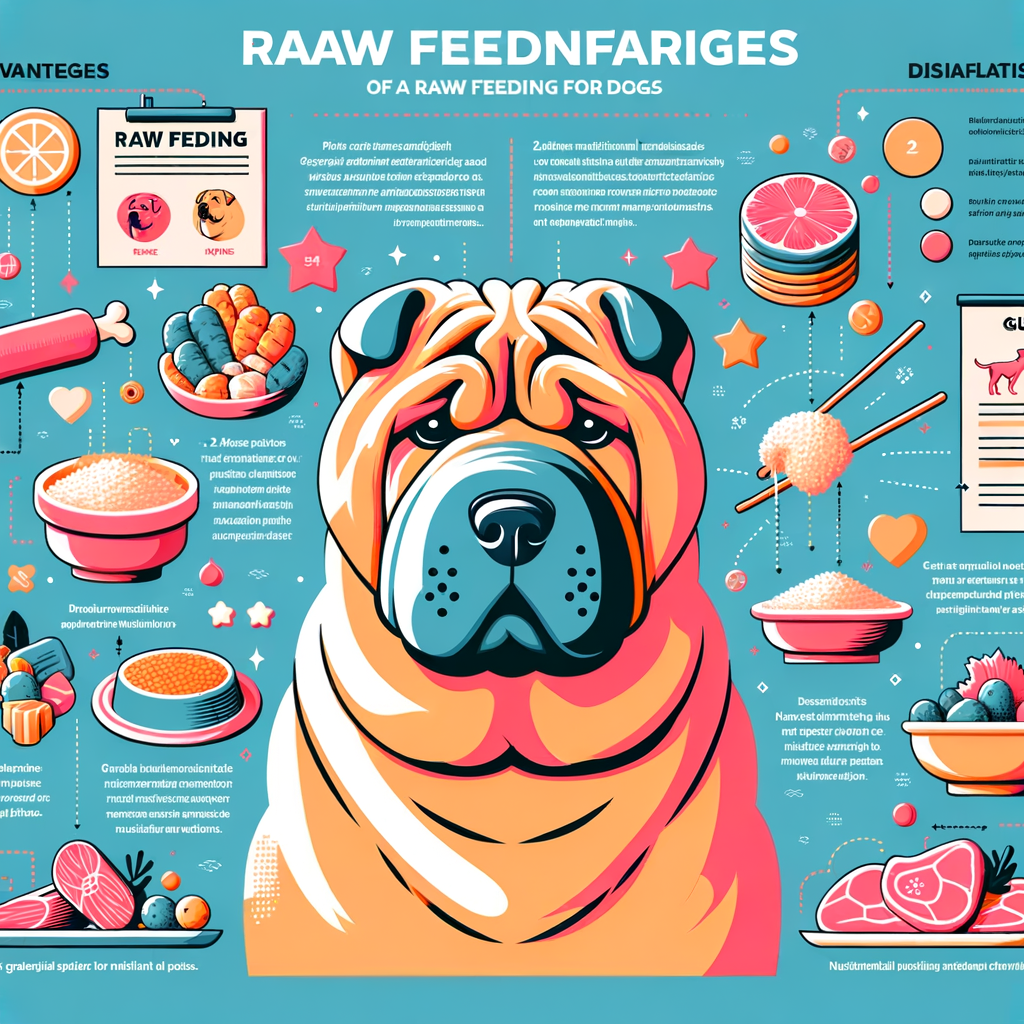
Introduction to Raw Feeding for Shar Peis
Feeding your Shar Pei a raw diet can be a big decision. It’s important to understand what raw feeding is and why it might be a good choice for your dog. Let’s dive in and learn more about this concept.
- Understanding the concept of raw feeding
- Why raw feeding is considered for Shar Peis
Raw feeding, also known as the BARF diet (Biologically Appropriate Raw Food), is a type of diet for dogs that includes feeding them raw meat and other uncooked ingredients like fruits and vegetables. The idea behind raw feeding is to provide a diet that closely resembles what dogs would naturally eat in the wild.
Shar Peis, like other breeds, can benefit from a raw diet in several ways. Raw diets are often high in protein, which can help build strong muscles. They also tend to be lower in carbohydrates than commercial dog foods, which can be beneficial for Shar Peis that are prone to certain health issues like obesity and skin problems. Additionally, raw diets can help improve a dog’s coat, skin, and teeth health, and boost their energy levels.
However, it’s important to note that raw feeding isn’t for every dog or owner. It requires careful planning and preparation to ensure your Shar Pei is getting a balanced diet. Always consult with a veterinarian or a pet nutrition expert before switching your dog to a raw diet.
Nutritional Needs of Shar Peis
Understanding the nutritional needs of Shar Peis is the first step to ensuring their health and longevity. These unique dogs require a balanced diet to thrive, just like any other dog breed. However, due to their distinctive characteristics, they might need a slightly different nutritional approach.
- Essential nutrients for Shar Peis
- Protein: Protein is vital for muscle development and repair. It should make up about 18-25% of an adult Shar Pei’s diet. Poultry, fish, and lean meats are excellent sources of protein.
- Fats: Fats provide energy and help in the absorption of certain vitamins. They should make up about 10-15% of the diet. Sources include fish oil and flaxseed.
- Carbohydrates: Carbohydrates provide energy and aid in digestion. They should make up about 50-60% of the diet. Good sources include brown rice and sweet potatoes.
- Vitamins and Minerals: These are necessary for various bodily functions, including bone health and immune system function. They can be found in fruits, vegetables, and certain meats.
- How raw feeding meets these nutritional needs
- Protein and Fats: Raw meat and bones are rich in protein and fats, meeting the primary nutritional needs of Shar Peis.
- Carbohydrates: Fruits and vegetables in the raw diet provide the necessary carbohydrates.
- Vitamins and Minerals: The variety of fruits, vegetables, and raw meats in the BARF diet ensures a good supply of essential vitamins and minerals.
Shar Peis require a diet rich in protein, fats, carbohydrates, vitamins, and minerals. Let’s delve into each of these nutrients:
Raw feeding, also known as a Biologically Appropriate Raw Food (BARF) diet, can meet these nutritional needs effectively. This diet includes raw meat, bones, fruits, vegetables, and supplements, providing a balanced and nutrient-dense diet.
In conclusion, understanding the nutritional needs of your Shar Pei and how a raw diet can meet these needs is crucial for their health. However, it’s always best to consult with a vet before making any significant changes to your pet’s diet.
Benefits of Raw Feeding for Shar Peis
Feeding your Shar Pei a raw diet can have numerous benefits. While it’s important to consult with a veterinarian to ensure a balanced diet, many Shar Pei owners have reported significant improvements in their dogs’ health and vitality. Let’s look at some of the key benefits:
- Improved Coat Condition
- Better Digestive Health
- Increased Energy Levels
- Weight Management
One of the most noticeable benefits of a raw diet is an improvement in your Shar Pei’s coat condition. The coat becomes shinier and healthier, with less shedding. This is because raw diets are rich in natural oils and nutrients that are essential for skin and coat health.
Raw diets are easier for dogs to digest compared to commercial dog foods. This is because they are more biologically appropriate, meaning they are closer to what dogs would naturally eat in the wild. As a result, Shar Peis on a raw diet often experience fewer digestive issues and produce smaller, less smelly stools.
Many owners report that their Shar Peis have more energy when fed a raw diet. This is likely due to the high-quality, easily digestible proteins and fats found in raw foods. With more energy, your Shar Pei will be more active and playful, which is beneficial for their overall health and wellbeing.
Raw diets can also help with weight management. Because they are more filling and satisfying than commercial dog foods, Shar Peis are less likely to overeat. Furthermore, the high protein content of raw diets can help to maintain lean muscle mass, while the lower carbohydrate content can help to prevent weight gain.
In conclusion, a raw diet can offer a range of benefits for your Shar Pei. However, it’s important to ensure that the diet is balanced and appropriate for your dog’s specific needs. Always consult with a veterinarian or a canine nutritionist before making significant changes to your dog’s diet.
Drawbacks of Raw Feeding for Shar Peis
While raw feeding can offer numerous benefits to your Shar Pei, it’s important to understand that this diet also comes with certain drawbacks. These challenges can make raw feeding a less than ideal choice for some pet owners. Let’s explore these potential issues.
- Potential for Nutritional Imbalances
- Risk of Bacterial Contamination
- Increased Time and Effort in Meal Preparation
One of the biggest challenges with a raw diet is ensuring your Shar Pei gets all the nutrients it needs. Unlike commercial dog food, which is carefully formulated to meet all of a dog’s nutritional needs, a raw diet requires careful planning and knowledge. Without this, your dog could end up with nutritional imbalances, which can lead to health problems. For instance, a diet too high in protein and fat, but low in carbohydrates, can lead to weight gain and other health issues.
Raw food, especially meat, carries a higher risk of bacterial contamination than cooked food. This can pose a risk not just to your Shar Pei, but also to you and your family. Bacteria like Salmonella and E. coli are common in raw meat and can cause serious illness. It’s crucial to handle and store raw food properly to minimize this risk.
Preparing a raw diet for your Shar Pei can be time-consuming. Unlike commercial dog food, which is ready to serve right out of the bag, a raw diet requires you to prepare each meal from scratch. This includes sourcing the ingredients, preparing them, and ensuring they are stored safely. This can be a significant commitment, especially for busy pet owners.
In conclusion, while a raw diet can offer many benefits, it’s important to consider these potential drawbacks. It’s always best to consult with a veterinarian or a pet nutrition expert before switching your Shar Pei to a raw diet.
Raw Feeding Guide for Shar Peis
Feeding your Shar Pei a raw diet can be a rewarding experience, but it requires careful planning to ensure it’s balanced and nutritious. Here’s a guide to help you get started.
Planning a Balanced Raw Diet
A balanced raw diet for your Shar Pei should include the right meat sources, necessary fruits and vegetables, and supplements if needed. Let’s explore each of these components in detail.
- Choosing the right meat sources
- Including necessary fruits and vegetables
- Adding supplements if needed
Meat is the cornerstone of a raw diet for Shar Peis. It should make up about 50% of your dog’s meal. Choose a variety of meats to provide a range of nutrients. Beef, chicken, lamb, and turkey are all good choices. Remember to include organ meats like liver and kidney, which are rich in essential nutrients.
Fruits and vegetables should make up about 25% of your Shar Pei’s raw diet. They provide essential vitamins, minerals, and fiber. Apples, carrots, spinach, and blueberries are all excellent choices. Remember to chop or puree them to aid digestion.
Even with a well-planned raw diet, your Shar Pei may need supplements to ensure they’re getting all the necessary nutrients. Common supplements include fish oil for omega-3 fatty acids, and a multivitamin to cover any gaps in nutrition. Always consult with your vet before adding any supplements to your dog’s diet.
Remember, every dog is unique and may have different nutritional needs. Always consult with a vet or a pet nutrition expert when planning a raw diet for your Shar Pei.
Transitioning from Commercial to Raw Diet
Switching your Shar Pei from a commercial to a raw diet is a significant change. It’s important to do it gradually and monitor your pet’s reaction closely. Here’s how to do it:
- Gradual Transition Process
- Monitoring your Shar Pei’s Reaction
Transitioning your Shar Pei to a raw diet should be a slow and steady process. Start by replacing a small portion of your pet’s commercial food with raw food. Gradually increase the amount of raw food over a period of a few weeks. This slow transition will help your Shar Pei’s digestive system adjust to the new diet.
As you transition your Shar Pei to a raw diet, it’s crucial to monitor their reaction. Pay attention to their energy levels, weight, and overall health. If your Shar Pei seems lethargic or loses weight rapidly, it may be a sign that the raw diet isn’t working for them. In such cases, consult your vet immediately.
Remember, every dog is unique and may react differently to a raw diet. It’s important to be patient and flexible during this transition period. With careful planning and monitoring, your Shar Pei can successfully transition to a raw diet and enjoy the many health benefits it offers.
Raw Diet Impact on Shar Peis Health and Diet
Understanding how a raw diet impacts the health and diet of Shar Peis is crucial for pet owners considering this feeding approach. To provide a balanced perspective, we will explore two case studies that highlight both the positive and negative impacts.
Case Studies
-
Case Study 1: Positive Impact
Meet Bella, a 4-year-old Shar Pei who switched to a raw diet when she was 2. Bella’s owner noticed significant improvements in her health. Bella’s coat became shinier, her energy levels increased, and her digestive issues improved. Bella’s owner also reported a decrease in vet visits, attributing it to the raw diet.
-
Case Study 2: Negative Impact
On the other hand, we have Max, a 3-year-old Shar Pei. Max’s owner switched him to a raw diet when he was 1. Unfortunately, Max developed nutritional deficiencies, leading to health issues like weight loss and lethargy. Max’s owner had to consult a veterinarian and switch back to a balanced commercial diet to restore Max’s health.
These case studies highlight the importance of understanding your pet’s individual needs and consulting with a veterinarian before making significant changes to their diet. While a raw diet can have positive impacts, it’s not suitable for every Shar Pei.
Key Takeaways
- Understanding the Potential Risks and Rewards
- Importance of Consulting with a Veterinarian
Feeding your Shar Pei a raw diet can have both positive and negative impacts. On the one hand, it can lead to improved skin health, a shinier coat, and increased energy levels. On the other hand, it can also pose risks such as bacterial infections and nutritional imbalances. Therefore, it is essential to understand these potential risks and rewards before deciding to switch your Shar Pei to a raw diet.
Before making any significant changes to your Shar Pei’s diet, it is crucial to consult with a veterinarian. They can provide expert advice based on your dog’s specific health needs and conditions. They can also help you design a balanced raw diet plan and guide you on safe food handling practices to minimize the risk of bacterial infections. Remember, the health and well-being of your Shar Pei should always be your top priority.
Conclusion: Pros and Cons of Raw Diet for Shar Peis
As we wrap up our discussion on raw feeding for Shar Peis, it’s essential to summarize the main points we’ve covered. We’ve seen that a raw diet can offer numerous benefits for your Shar Pei, but it also comes with its own set of challenges. Let’s take a closer look.
- Summary of benefits and drawbacks
- Final thoughts on raw feeding for Shar Peis
A raw diet can provide your Shar Pei with a range of nutrients that are often missing from commercial dog foods. This diet can lead to a healthier coat, improved digestion, and increased energy levels. However, it’s important to note that a raw diet can also pose risks. These include potential exposure to harmful bacteria, the possibility of an unbalanced diet, and the time and effort required to prepare meals.
| Benefits | Drawbacks |
|---|---|
| Improved coat health | Potential exposure to harmful bacteria |
| Better digestion | Possibility of an unbalanced diet |
| Increased energy levels | Time and effort required for meal preparation |
In conclusion, the decision to switch your Shar Pei to a raw diet should not be taken lightly. It requires careful consideration and planning to ensure your dog’s nutritional needs are met. If you choose to go this route, it’s recommended to consult with a veterinarian or a pet nutrition expert to help guide you through the process. Remember, the ultimate goal is to provide the best possible care for your Shar Pei, whether that includes a raw diet or not.














